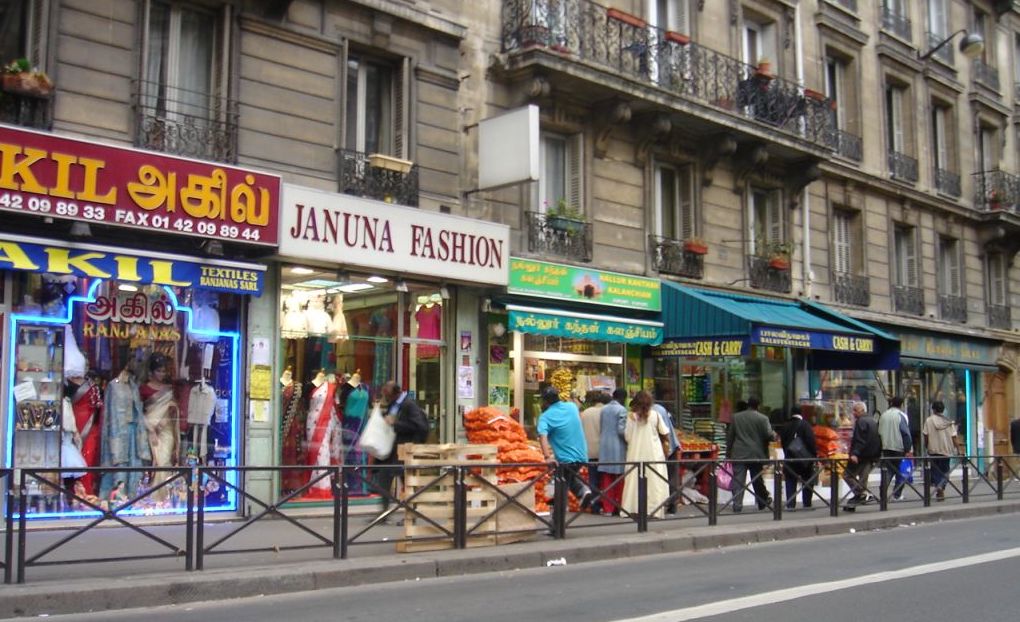
___
***Are you or someone you know in the global Tamil community doing great things? We'd love to feature them: FILL OUT THIS FORM ***
Network & collaborate with Tamil Changemakers from around the world. Request to join our private LinkedIn community here.
___
In my opinion, the Tamil diaspora is arguably one of the widest spread in the world, spanning over fifty countries[1]. The Tamil diaspora refers to the descendants of Tamil immigrants who emigrated from their ancestral homelands of modern day South India and Sri Lanka (தமிழகம்) to other parts of the world. The dispersal of Tamils around the world is not a recent trend; the Tamil people have influenced the development of many societies around the world through culture, heritage and language. These values tie the Tamil diaspora together, forging a common identity in reconciling elements of their ancestral homelands with the lands they now call home.
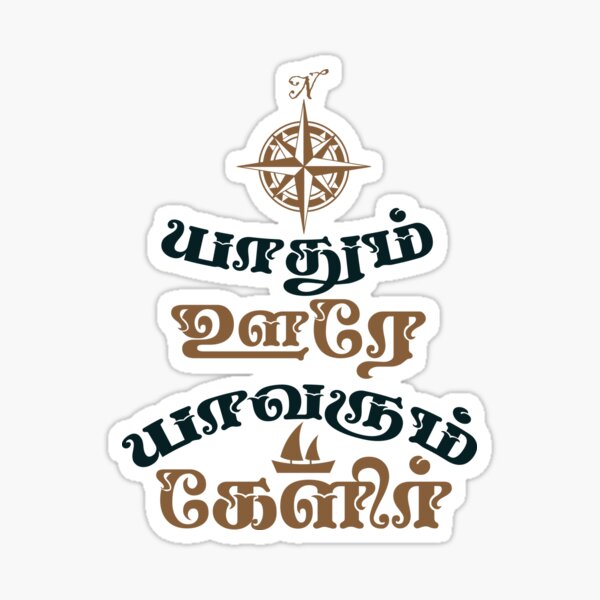
While our culture, heritage and language are common among all Tamils, there are many variations of these values among our people. This is even true within Tamils living in the same nation. Tamils from Sri Lanka (ஈழத் தமிழர்) for example will find that there are differences between those who are from Jaffna (யாழ்ப்பாணம்) in the North, Batticaloa (மட்டக்களப்பு) and Trincomalee (திருகோணமலை) in the East, and Colombo (கொழும்பு) in the South. There are even cultural and linguistic differences between these Tamils and the Hill Country Tamils of Indian origin (மலையகத் தமிழர்) and the Sri Lankan Moors (இலங்கைச் சோனகர்) who can trace parts of their ancestry to the Middle East[2]. These differences exist due to historical reasons, resulting in the shaping of these micro identities[3] within the Tamil fabric.
This also applies to many Tamils in the diaspora community as well. Countries like France have such diversity within the Tamil community (பிரான்சியத் தமிழர்). France has intentionally avoided implementing race-conscious policies, banning the collection of census or other data on the ethnicity of its citizens[4]; however, estimates place the French Tamil population at around 100,000[5]. I will delve into the micro Tamil communities forming the French Tamil identity. This only illustrates my perspective as an outsider and provides some insight into the different aspects of this community. It does not fully encompass all the intracacies that exist.
Tamils of Indian Origin
Pondicherry
In 1674, the municipality of Pondicherry (பாண்டிச்சேரி), located in the southeast cost of India surrounded by Tamil Nadu, became a French colony of the French colonial empire. During this period, a few Tamils in Pondicherry immigrated to France taking roles in the French government on service.
Pondicherry was an essential part of French India (பிரெஞ்சு இந்தியா) up until 1954 when it was transferred to the newly formed Republic of India. French India ceased to exist in 1962 with the signing of a treaty making it official. In the treaty, people living in Pondicherry were given a six-month period to claim French citizenship; those not obtaining it would be given Indian citizenship instead[6]. Many in Pondicherry took the offer of French citizenship and moved to France in search of better opportunities.
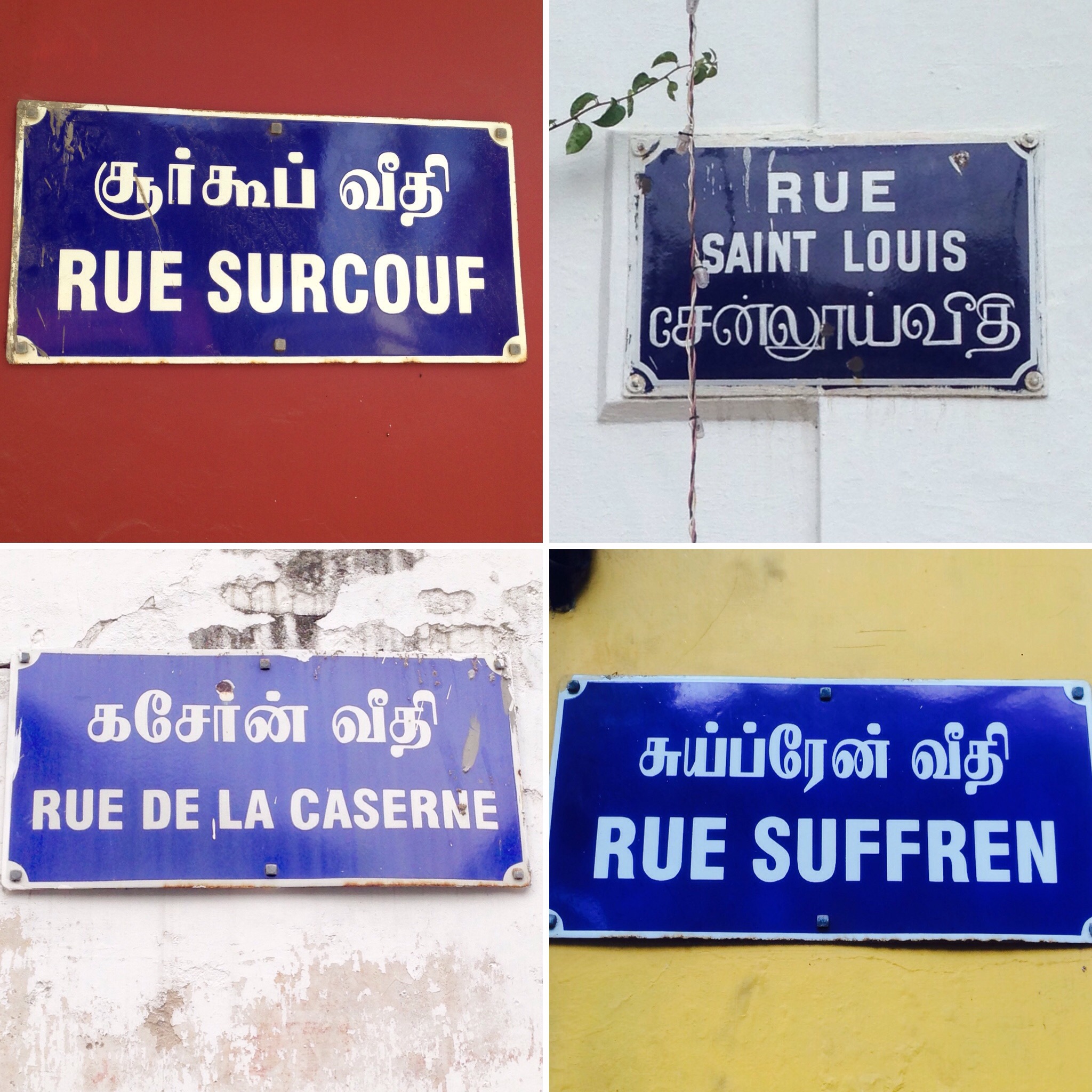
Since the 1950s, the neighbourhoods of Gare du Nord in Paris have been home to many migrants from India, both from Pondicherry and from other parts of India such as Tamil Nadu.
Tamils of Sri Lankan Origin
The majority of Tamils of Sri Lankan origin came to France in the 1980s as refugees following the start of the Sri Lankan Civil War.
While a Tamil presence already existed in France through the Tamils of Indian origin, they have already integrated to a certain degree, spoke French to varying levels of adequacy following colonial rule, and immigrated to France under very different circumstances. As a result, the existing community in France was small in number and was somewhat dispersed and disorderly.
The Tamils of Sri Lankan origin had very few similarities to the Tamils of Indian origin due to the cultural and linguistic differences. Mainly settling in Paris, the Tamils of Sri Lankan origin began forming tightly knit communities and networks in the Saint-Denis area, also known as La Chappelle. As a result, Tamil owned businesses, newspapers, radio stations and other services seemingly appeared overnight. This area is now known as Little Jaffna, even sometimes being referred to as Little India[7].
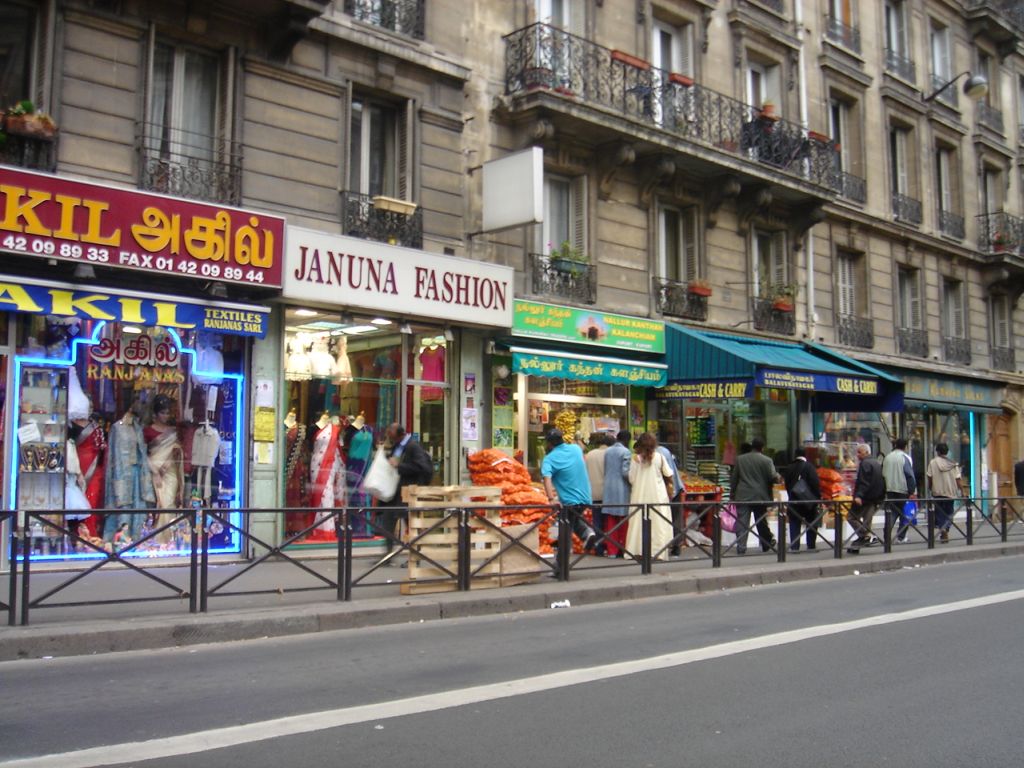
In 1985, the Tamils of Sri Lanka built the Manicka Vinayakar Aalayam Temple ( மாணிக்க விநாயகர் ஆலயம்) dedicated to Vinayakar (விநாயகர்), the God of knowledge. An annual procession takes place from this temple to celebrate Vinayakar Chathurthi (விநாயகர் சதுர்த்தி), a Hindu festival for Vinayakar[8]. This festival has forged the identity of La Chappelle in Paris, attracting devotees from all over Europe and even North America.
DROM Tamils
While the colonization period has ended in most of the world, France continues to administer territories outside of Europe, most of which are the remains of the French colonial empire period. There are approximately three million people living in these territories, most of whom are French citizens and EU citizens as a result of France’s continued administration of these territories[9].
These territories have varying constitutional statuses, resulting in varying levels of French law applying to them. I will be focussing in on the overseas departments and regions of France (départements et régions d’outre-mer ou DROM) territory where there is a strong Tamil presence.
Réunion/Île Bourbon
Réunion is a DROM island in the Indian Ocean, not too far away from Madagascar and Mauritius. It is considered an integral part of France, and by extension, one of the territories that is the farthest away from the Eurozone and continental Europe. There has been a Tamil presence on the island since the 17th century, with most Tamil migrants coming from Pondicherry as indentured labourers. Today, the Tamil community is known as the Malbars and make up approximately 25% of Réunion’s population.
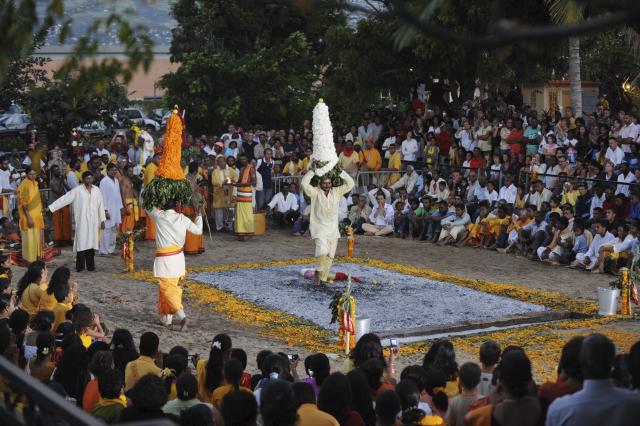
The term Malbar was used by the French to refer to all indentured workers from South India. Though the term comes from the Malabar region in Kerala, it has been used mainly to refer to the Tamil labourers making up the majority of this population. Because of colonization, the Tamil language was lost, with a regionalized French became the main language for the Malbars. Additionally, forced conversion resulted in many of the Malbars becoming Christian.
Despite having lost the language, the Malbars had a continued and growing interest preserved their culture, religion and heritage. There are many temples that have been constructed in Réunion and many Malbars have converted back to Hinduism. With a population of about 180,000, the Malbars have a strong influence in the community and continue to maintain pride in their identity.
A New Identity in Emergence
There are two groups within any diaspora community: those who immigrated to establish the founding of the community, and their descendants who will most likely spend their entire lives in the host country, calling it home. Regardless of the origins of the Tamils in France, be it India, Sri Lanka or Réunion, the next generation of Tamils will share a common identity being born and raised in France. Just like other second generation[10] Tamils living in other countries, the Tamils of France go through the struggle of reconciling their French and ancestral identities. However, I would argue that the complexity of the origins of the Tamil community as a whole in France highly illustrates the variation and diversity within our community.
The next generation of Tamils in France are akin to the next generation of Tamils in Canada. Regardless of their national origins, the French Tamil identity is an emerging new face in France. The French Tamils are millennials and influencers, many of whom are now having children and raising a new generation of Tamils in France.
Their experiences of reconciling their ancestral heritage with the realities of day-to-day life in another culture and another language are no different from those faced by Tamil Canadians and other Tamils in the diaspora community. The French Tamil identity is contributing to the image of France and is continuously evolving.
As the Tamil identity continues to grow in France as well as in all Tamil diaspora communities across the world, my hope is that we continue to embrace, take pride in, and never lose our ancestral identity. I think it’s amazing that there are French Tamil Youtubers making videos about their experiences and how these can resonate with what I feel and go through living in Canada. Unlike our ancestors centuries ago who were forced to forget their language and culture in places like Réunion, our generation has a choice to preserve what we know or to voluntarily give it up. My hope is that we do not choose the latter; while I only have an outsider’s understanding of the Tamil community in France, I feel that our ancestral language and culture will continue to survive there, as I believe it will in many parts of the world.
[6] https://timesofindia.indiatimes.com/city/chennai/more-from-puducherry-queuing-up-for-french-citizenship/articleshow/15909624.cms
[10] https://www12.statcan.gc.ca/nhs-enm/2011/as-sa/99-010-x/99-010-x2011003_2-eng.cfm Note that this terminology may vary among different nations. Essentially, it is used to denote the children born to at least one immigrant parent.
**Looking to create your love story? Join the other couples who have dated and got married through myTamilDate.com!***
"myTamilDate Love Story: Jenani & Nav Found Each Other At The Right Time And Right Place In Life"
"myTamilDate.com Love Story: Tharshi & Ravi Found Love During Lockdown"
"How France Met Canada: A MyTamilDate.com Love Story"
***CLICK HERE to listen to us on Spotify!***
Related Articles:
- "The Tamil Creator Podcast (EP #54): Chief Nishan Duraiappah - North America's First Tamil Chief of Police"
- "The Tamil Creator Podcast (EP #53): Chantal Sathi – From Scarborough To Oxford, Culminating In A Faith-Led Journey To Create Tech Company CornerstoreAI"
- "The Tamil Creator Podcast (EP #52): Himalesh Kumar - American Tech Entrepreneur Overcomes Dyslexia To Sell His Company To Warren Buffet's Berkshire Hathaway"
- "The Tamil Creator Podcast (EP #51): Samanta Krishnapillai - Sparking Social Change As Founder & Executive Director of "On Canada Project"
- "The Tamil Creator Podcast (EP #50): Thad Jayaseelan - Jet-Setter, Budding Entrepreneur & Go-To Barber For Athletes & Celebrities Like Drake And Big Sean"
- "The Tamil Creator Podcast (Ep.49): DJ Kow - Trailblazing & Popular Toronto-Based Female DJ"
- "The Tamil Creator Podcast (Ep.48): Gobinthiran Kulendran - 9 Schools And 21 Location Changes During A War Couldn't Stop This Entrepreneur From Finding Success"
- "Tamil Innovators Spotlight: Nivatha Balendra On Surviving Cancer & Building a CleanTech Startup"
- "Separated From Family During Sri Lanka's Civil War, Ganesh Thava Overcomes Childhood Adversities To Find Success As Actor, Writer & Director"
- "Singaporean-Born, Canadian-Raised, Decolonial Racial Equity Educator Channdika Thayver Delivers Powerful TEDx Talk On Racial Equity In The Workplace"
- "Tamil Innovators Spotlight: Theban Ganesh Discusses Building a Web3 Company, Improving Healthcare Through Blockchain, Successful Exits"
- "Karthy Subramaniam Co-founded Fast Growing Sauce Company LITS as a Tribute to a Childhood Friend"
- "Elite Athlete, Coach, Future Chiropractor & Entrepreneur Abirami Shanmugaratnam Is Making Waves In The Athletic Performance Industry"
- "Toronto's OG Food Writer Suresh Doss Is Using His Reach And Voice To Help Engineer A Comeback For Beleaguered Restaurant Industry"
- "Ballet And Kung Fu Trained Australian Actress & Writer Rubi Balasingam Is Promoting Tamil Voices In Aussie TV And Film"
- "Yathusha Kulenthiran's Marketplace For Environmentally Sustainable Palmyra Products Empowers Female Artisans In Sri Lanka"
- "Australian-Tamil Entrepreneur Sujan Selven Is Creating Economic Opportunities For Remote Villages In Northeast Sri Lanka Using Upcycled Devices & Improved Connectivity"
- "Crypto Tinhorn & Former Journalist Anand Venkateswaran Talks About Buying A $69M Digital Art Piece, Collecting Stories & Catalyzing Change"

























